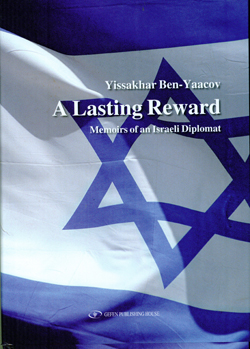A Lasting Reward: Memoirs of an Israeli Diplomat by Yissakhar Ben-Yaacov, Gefen Publishing House, ISBN 978-965-229-539-2, 309 pages, price unlisted.
By Donald H. Harrison

 SAN DIEGO– Author Yissakhar Ben-Yaacov, who left Germany as a child and thereby was saved from the Holocaust, returned to Germany and Austria as an Israeli diplomat, and additionally served his country in such far-flung posts as Philadelphia, Lagos, and Canberra. Along the way, he changed his family name “Jacobson” to “Ben-Yaacov,” Hebrew for “Son of Jacob.”
SAN DIEGO– Author Yissakhar Ben-Yaacov, who left Germany as a child and thereby was saved from the Holocaust, returned to Germany and Austria as an Israeli diplomat, and additionally served his country in such far-flung posts as Philadelphia, Lagos, and Canberra. Along the way, he changed his family name “Jacobson” to “Ben-Yaacov,” Hebrew for “Son of Jacob.”
If you enjoy the work of international relations and diplomacy–or you’re interested in just who an Israeli diplomat spends much of his working time with–then this book is you. On the other hand, if you want excitement or new insights into international relations, then you’d best look elsewhere.
Ben-Yaacov writes matter-of-factly about what he did, more often understating than overstating his role. He goes out of his way to acknowledge the good works of his staff members and contacts in each country, which no doubt will be appreciated by them and their families, but which adds little interest for outside readers.
Still, if you read carefully and patiently, there are some small triumphs which Ben-Yaacov deservedly takes pride in: While in Munich, he helped arrange for Hungarian artist Jozsef Koppay’s prophet-like portrait of Theodor Herzl to be purchased by William Robinson and donated to the Knesset, where it now hangs. While working in Israel’s foreign ministry, he helped to arrange for a doctor requested by Emperor Haile Selassie of Ethiopia to treat the empress, furthering Israel-Ethiopian relations. Following an earthquake in Iran during the time of the Shah, he coordinated shipments of blood plasma for the victims. He passed on lessons of Israel’s international aid program to Sargent Shriver, then heading the Peace Corps, who later told him: “I think I have discovered the secret of your success – it is your ability to think small.” As consul-general in Philadelphia, he helped organize a sister city relationship between that city and Tel Aviv –both cities being where their respective nations declared their independence.
Occasionally Ben-Yaacov shares anecdotes about Israel’s leaders. For example, there was the time that David Ben-Gurion came to the United States and was uncharacteristically late for a meeting. “I ascertained the real reason for Ben-Gurion’s tardiness: the man who had so persistently objected to bringing television to Israel was sitting in his suite opposite the television set, unable to tear himself away from the evening program He was in the middle of watching a movie and refused to miss the ending.” During the Six-Day War, many Israelis living in the United States wanted papers to return home to volunteer. Zila Netanyahu “arrived with her two sons, Jonathan and Benjamin. Benjamin was still a minor. The mother gave her agreement for her two sons to volunteer to serve at the front. With this, I saw no reason to refuse them a visa. That night, they both flew to Israel.”
During a break from the diplomatic service, Ben-Yaakov worked as a special advisor to Teddy Kollek, mayor of Jerusalem. An inveterate fund-raiser, Kollek lectured Ben-Yaacov memorably. “Whoever does not take upon himself an explicit pledge and signs a check on the spot, should not be taken seriously. The most elegant letter and the sincerest of words have no meaning for me if they are not directly related to a practical act.”
Later, as ambassador to Australia, Ben-Yaacov’s portfolio also included various South Pacific countries including Kirabati, formerly known as the Gilbert Islands. Approaching the residence of President Ieremia Tienang Tabai to present his credentials, Ben-Yaacov and his wife Priva “saw a man and a woman, both barefoot, the man wearing short pants. At first, we thought they were part of the residence staff. The woman in charge of the ceremony, who was driving the car, clarified the picture: these were the president and his wife. Indeed, I had been warned in advance that the presentation ceremony would be ‘very informal.'”
*
Harrison is editor of San Diego Jewish World. He may be contacted at donald.harrison@sdjewishworld.com